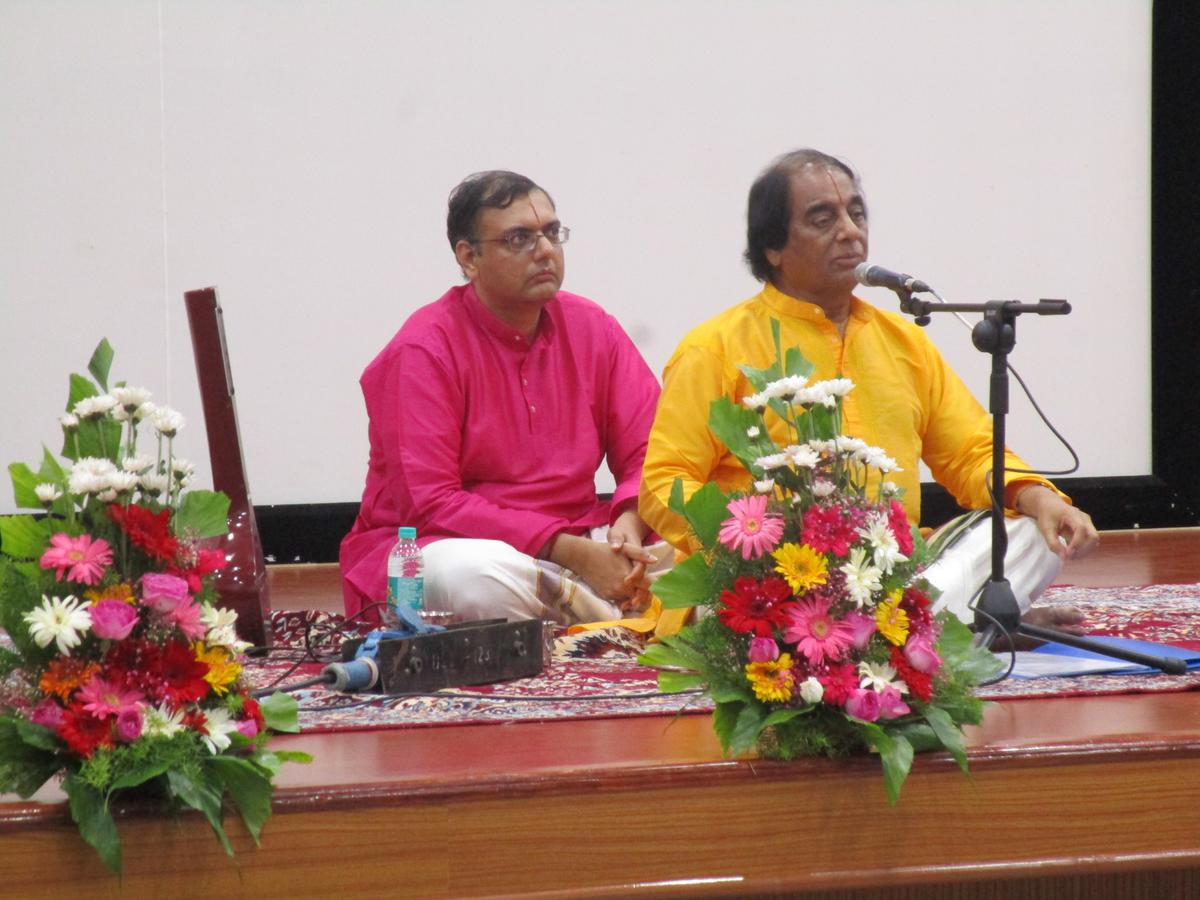Madurai T.N. Seshagopalan on what makes Harikesanallur Muthiah Bhagavatar a versatile composer
It was a journey down memory lane at Nadasurabhi Cultural Association in Bengaluru as it was the 75th birth anniversary celebration of the versatile musician Madurai T.N. Seshagopalan. During this event, the organisation honoured him with a Lifetime Achievement Award in a grand and fitting manner.
Harini Raghavan, the secretary of Nadasurabhi, reminisced about the organisation’s three-decade-long association with TNS. She highlighted their history of arranging concerts, hosting him, and engaging in conversations solely centered on music, occasionally with witty references to food.
Some of the senior artistes who have accompanied Seshagopalan also recalled their association with the veteran artiste. Octogenarian mridangam vidwan A.V. Anand spoke about TNS’s on-stage spontaneity and shared his experiences of accompanying him on various occasions. Violinist H.K. Venkatram recounted his experience on how for the first time he substituted for the artiste who was to accompany Seshagopalan at a Ramanavami concert in Bangalore.
Vocalist Gayathri Girish, a disciple of T.N. Seshagopalan, shared her insights about both learning directly from him and through listening to his concerts.
Ramesh Swamy of Unnati Foundation recalled Seshagopalan’s impromptu Nayaki raga essay for the kriti ‘Ranganayakam’ at one of his earlier concerts at the Andavan Ashram, Jayanagar, Bengaluru, that had a lasting impact.
Dr. M.R.V. Prasad, physician and president of the Bangalore Gayana Samaja, spoke about Seshagoplan’s unwavering devotion to music, highlighting his proficiency in playing veena, keyboard, and harmonium, and how the veteran musician shared his musical knowledge with the audience at a week-long music conference held in Bengaluru in 2005.
He also fondly remembered when TNS was honoured with the Sangeeta KalaRatna by Bangalore Gayana Samaja in 2005 and hispresidingover a week-long music conference, enlightening the audience with his wisdom.
Harikesanallur Muthiah Bhagavatar.
| Photo Credit:
GANESAN V
Tributes to Muthiah Bhagavatar
Following the award ceremony, T.N.S. Krishna, son and disciple of Seshagopalan, presented a short film documenting the veteran musician’s life and experiences. Seshagoplan paid tributes to Harikesanallur Muthiah Bhagavatar, emphasising his contributions to classical music and harikatha. His guru Ramanathapuram Sankarasivam trained under Muthiah Bhagavatar for 16 years.
TNS mentioned that Muthiah Bhagavatar excelled not only in music but also in harikatha, highlighting his prowess as a musicologist and composer. It is probably this aspect that would have influenced Seshagopalan to adopt Bhagavatar’s style while presenting Harikatha. Also discussed were how Muthiah Bhagavatar has composed diverse range of compositions — from pada and daru varnams to kritis, thillanas, viruthams, themmangu, and kavadichindu.
Seshagopalan presented a picture of Bhagavatar as a tall and lively person, who was fond of perfumes and wished to wear new clothes every day. The veteran musician also shared insights about Bhagavatar’s initial music training in Tiruvaiyaru under Sambasiva Bhagavatar , who belonged to the Tyagaraja lineage; his learning of Lakshana gitas, thayams from T.S. Sabesa Iyer, son of Sambasiva Bhagavatar; and his vocal practice to achieve singing in three octaves effortlessly. It was interesting to note that Harikesanallur Bhagavatar was just 20 years old when he was appointed the asthana vidwan of Travancore in 1897.

Madurai T.N. Seshagopalan accompanied by son and disciple T.N.S. Krishna at his presentation on Harikesanallur Muthiah Bhagavatar in Bengaluru, on September 17, 2023.
| Photo Credit:
Special Arrangement
Seshagopalan also traced Muthiah Bhagavatar’s journey of performing Harikatha (which was originally started by Thanjavur Krishna Bhagavatar based on the Marathi kirtans), and how he continued the tradition on the lines of veterans such as Palakkad Anantharama Bhagavatar and Kallidaikurichi Vedantha Bhagavatar.
Intricate laya aspects
By singing a kavadichindu with intricate laya aspects, Seshagopalan demonstrated Muthiah Bhagavatar’s creativity. He also delved into how Muthiah Bhagavatar composed his own ‘nirupanams’ for his harikathas, and the thillana in ‘Valli Parinayam.’
Highlighting Bhagavatar’s enduring legacy, T.N. Seshagopalan noted that his compositions have become more popular than the composer himself. He shared anecdotes about Bhagavatar’s performances at Mysuru during the Dasara festival, which earned him the position of chief asthana vidwan of Mysore samasthanam. Seshagopalan elaborated on the distinctive features of Bhagavatar’s compositions, including the starting notes and unique eduppus in his Sahana and Kiravani compositions, and his mastery in vadi-samvadi poruthams by singing a part of Suddha Dhanyasi varnam. He followed it up with a grand elaboration of the third chittaswaram from the Mohanam raga Ata tala varnam and another chittaswaram from the Khamas raga daru varnam with brilliant swaraksharas.
To illustrate the creativity of Muthiah Bhagavathar, Seshagopalan briefly sang the ‘English Note’ popularised by Madurai Mani Iyer and the signature tune of Akashvani, set in raga Vijayanagari. TNS briefed about Bhagavatar’s stay in Varanasi, where he listened and adapted many Hindustani ragas, the most popular being the Hamsanandi raga. He also highlighted Bhagavatar’s contributions of new ragas to Carnatic music such as Karnaranjani and Pasupathipriya. TNS observed that raga Budhamanohari could have been inspired by a graha bhedam in Kuntalavarali raga, as Muthiah Bhagavatar was an expert in graha bhedam and had presented a lec-dem exclusively on the subject at The Music Academy in Chennai.
TNS recognised Bhagavatar’s role in preserving Swati Tirunal compositions. His treatise, Sangita Kalpadrumam, that covers various musical concepts made him the first musician to be conferred an honorary doctorate. He concluded his presentation with a composition dedicated to Harikesanallur Muthiah Bhagavatar, celebrating the ragas he contributed to Carnatic music.
For all the latest Entertainment News Click Here
For the latest news and updates, follow us on Google News.
